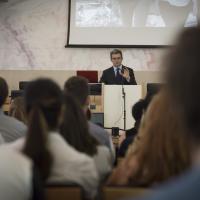
Developing holistic experiences for enhancing student employability and professional identity Faculty Spark - View, reflect and apply
Last updated on 10/09/2019
-
You must be signed in to access this function
0
Description
In a targeted approach to enhance students’ career management and communication skills, a partnership was created between Griffith’s Nursing and Midwifery program and the Careers and Employment Service to deliver career seminars.
Challenge
It was recognised by the Nursing and Midwifery Lifecycle Team that students perceived that they were not adequately prepared for graduation and to enter the workforce. Some key concerns raised by students included:
- They did not have all of the information needed to plan and manage their careers;
- Lack of time to plan for their career, especially in light of their clinical placements;
- Lack of practical learning opportunities to address elements of careers management and job seeking
There was thus a significant need to raise students’ awareness on the importance of planning and managing their careers, whilst also equipping them with the requisite life skills to achieve this.
Approach
In order to develop students’ understanding of how to manage their careers and enhance the student lifecycle, the Nursing and Midwifery Team reached out to the Careers and Employment Service. The approach undertaken was to jointly facilitate a series of seminars on the fundamentals of career management, this included:
- Deconstructing job advertisements;
- Analysing and mapping own skill sets against selection criteria; and
- Preparing professional resumes, cover letters and responses to selection criteria.
The purpose of these seminars was to 1) develop students understanding of how to successfully plan for and manage their careers and 2) develop their verbal and written communication skills within a professional context.
Outcomes
Seminars were jointly run between Rhonda and Martin. This ensured that students were provided with the opportunity to ask discipline-specific questions, whilst being provided with an employability perspective. Furthermore, these seminars developed key employability skills that are crucial to student success, including: career management and communication skills.
The key success factor of our approach was incorporating both the perspective of a clinical lecturer and an employability professional. This provided students with the opportunity to draw upon the knowledge base of two diverse perspectives. Anecdotal feedback received from students highlighted the positive impact of these sessions in providing them with a forum in which they can practice writing a cover letter. As this is not a mandatory seminar for students to attend, the commitment of participants highlights the importance of these sessions to their professional and personal development.
Finally, this approach also aided the professional development of both of us, as we were able to see employability from another perspective.
Implement
If you are thinking about implementing this approach, here are some key things to consider:
- Reinforce to students that seminar capture is not always as beneficial as live attendance. When attending, students can directly ask questions and practise skills being highlighted;
- Carefully consider how to market these seminars to students. Ask students how they heard about this event and what made them attend. This will allow you to alter your form of communication and marketing of this event in line with student comments; and
- When the academic is seen as a partner in the development and delivery of the seminar, it sends a powerful message to the students that it is important for their professional development. Additionally through being in the room, academics have the opportunity to hear student concerns and gauge their degree of confidence, thus informing improvements to the delivery for the next cohort.
Next Steps
To further enhance this initiative, we will seek to:
- Consult with the Student Lifecycle Committee to discuss the possibility of including future career development seminars in a systematic manner. The purpose of this would be to increase student participation and highlight the importance and significance of students participating;
- Consult with the Nursing and Midwifery Team to discuss the potential of embedding a more holistic program of career development learning. This will ensure that students are provided with a more comprehensive understanding of what being ‘career ready’ involves, and the opportunity for students to develop their career management skills.
Contributed by
-
Griffith Health
School of Nursing and Midwifery
Rhonda Beggs
r.beggs@griffith.edu.au
http://orcid.org/0000-0003-4404-0402
Griffith Experts profile -
Careers and Employment Service
Martin Stead
m.stead@griffith.edu.au
Licence
© 2024 Griffith University.
The Griffith material on this web page is licensed under a Creative Commons Attribution NonCommercial International License (CC BY-NC 4.0). This licence does not extend to any underlying software, nor any non-Griffith images used under permission or commercial licence (as indicated). Materials linked to from this web page are subject to separate copyright conditions.
Preferred Citation
(2019). Developing holistic experiences for enhancing student employability and professional identity. Retrieved from https://app.secure.griffith.edu.au/exlnt/entry/4645/view

